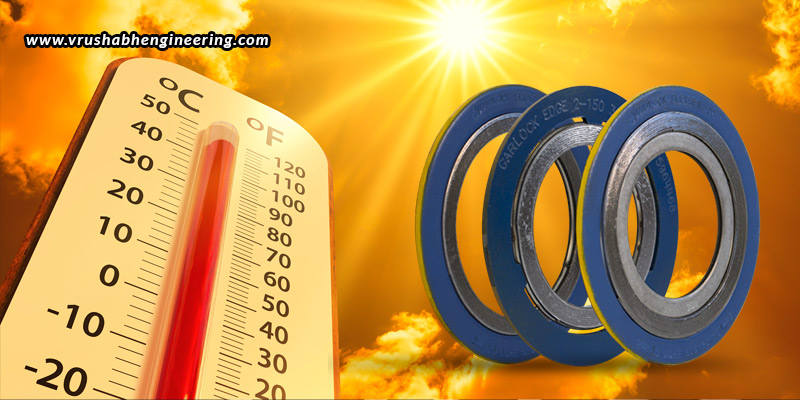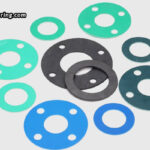In the field of industrial sealing, temperature stands out as a critical factor that affects both the longevity and effectiveness of a gasket. A gasket may function flawlessly under normal conditions, but when subjected to extreme temperatures, the material can deteriorate, warp, or entirely lose its sealing ability. In industries where equipment reliability is essential, such as oil and gas, food processing, chemical production, or power generation, it is crucial to comprehend how temperature interacts with gasket materials to avert leaks, minimize downtime, and avoid expensive replacements. This blog delves into the effects of temperature on gasket performance, analyzing various material types and their responses to different thermal environments.
The role of temperature in gasket usage
Gaskets function primarily as pressure distributors; they compress between flanges to form a seal that prevents the escape of fluids or gases. Their sealing capability relies on the material’s elasticity, compressibility, and resistance to chemicals. Temperature has a direct impact on all these characteristics. At higher temperatures, many gasket materials may soften, deform, or lose their tensile strength. Conversely, at lower temperatures, they can become rigid or brittle, heightening the risk of cracking or inadequate flange conformity.
Thermal cycling presents an additional challenge. As equipment undergoes repeated heating and cooling, materials expand and contract at varying rates. This discrepancy in thermal expansion between the gasket and flange can lead to uneven stress distribution, ultimately resulting in leaks. Therefore, industries that function in extreme or fluctuating temperature conditions must exercise particular caution in their material choices.
Metals
When temperatures and pressures surpass the limits of elastomers or polymers, metals become the preferred gasket material. Stainless steel, Inconel, Monel, and other high-performance alloys are commonly used because they maintain sealing integrity under extreme conditions. Metals can withstand temperatures exceeding 600°C and endure significant pressure cycling, vibration, and mechanical stresses without losing strength. Their durability makes them indispensable in oil and gas, chemical processing, nuclear facilities, and power generation plants. In addition, metal gaskets are often designed as ring-type joints or spiral wound varieties to ensure reliable sealing in high-pressure, high-temperature, and corrosive environments.
Rubber
Rubber gaskets are widely used for general sealing needs because of their flexibility, compressibility, and affordability. Different types of rubber, such as natural rubber, neoprene, butyl, and silicone, address varied requirements ranging from HVAC and water systems to gas, oil, and light chemical applications. Rubber performs well in low-to-medium temperature ranges and provides dependable sealing against liquids and gases. However, it is not suitable for harsh chemical exposure or extreme heat, which can cause deterioration. Careful selection of the right rubber compound is crucial for longevity. Industries such as plumbing, automotive, and light manufacturing rely heavily on rubber gaskets.
PTFE
PTFE is one of the most versatile gasket materials, celebrated for its outstanding chemical resistance, low friction, and stability across a wide temperature spectrum. It functions effectively from cryogenic conditions at –200°C up to 260°C, making it ideal for handling aggressive chemicals and corrosive media. Expanded and filled PTFE variations improve strength, reduce creep, and enhance sealing under fluctuating pressures. Its non-reactive and non-contaminating nature makes PTFE especially suitable in food processing, pharmaceuticals, and cleanroom applications where purity is critical. Additionally, PTFE is widely adopted in chemical plants, piping systems, and vessels where consistent sealing and chemical durability are required.
Graphite
Graphite gaskets are highly valued for their exceptional resistance to heat and durability in demanding applications. They can operate at temperatures up to 500°C in oxidizing conditions and even higher in inert or reducing atmospheres. Flexible graphite exhibits excellent compressibility and recovery, ensuring reliable sealing despite pressure variations or thermal cycling. For added strength and resistance, metallic reinforcement such as stainless steel is often incorporated. Graphite is slightly vulnerable in highly oxidizing environments, where long-term degradation may occur. Power plants, refineries, and petrochemical facilities rely on graphite gaskets for sealing flanges, valves, and equipment in high-pressure, high-temperature processes.
Silicone
Silicone gaskets are widely appreciated for their broad temperature range, typically from –60°C to +230°C, along with their flexibility and inertness. Unlike many other elastomers, silicone is resistant to UV, ozone, and environmental aging, making it a dependable choice for long-term sealing. Its biocompatibility and hygienic properties make silicone popular in food, beverage, pharmaceutical, and medical applications. Silicone gaskets are also suitable for closures, autoclaves, steam lines, and equipment subject to frequent temperature variations. While they are versatile, silicone is not as resistant to hydrocarbons or strong chemicals compared to FKM or PTFE. Still, its performance in hygienic sealing remains unmatched.
EPDM
EPDM is a synthetic rubber recognized for its superior resistance to water, steam, and cleaning agents. Its durability in harsh washing and sterilization cycles makes it a preferred choice in beverage production, dairy operations, and water treatment plants. EPDM remains flexible and reliable across temperatures ranging from –40°C to around 150°C, offering a long service life with minimal degradation. It resists weathering, ozone, and mild chemicals, making it useful in outdoor applications as well. Industries commonly employ EPDM in pumps, valves, piping, and seals where sanitation and reliability are critical. Its cost-effectiveness further enhances its popularity in industrial sealing solutions.
FKM
FKM, often identified by the trade name Viton, is a premium elastomer designed for high-performance environments. It is particularly resistant to strong chemicals, oils, fuels, and aggressive hydrocarbons, functioning well under temperatures up to 200–250°C. Unlike many other elastomers, FKM maintains flexibility, compressibility, and sealing integrity under severe thermal and mechanical stresses. Its durability extends gasket life and reduces maintenance needs in critical systems. For this reason, FKM is widely employed in the chemical processing, aerospace, automotive, and oil and gas industries. Wherever reliability and long-term performance are essential, FKM gaskets offer an advanced solution for challenging sealing demands.
Temperature plays a crucial role in gasket performance. Elastomers can harden or crack, PTFE may experience creep, graphite withstands thermal cycling, and metals endure the most severe conditions. No single gasket material is ideal for every situation; the secret is to match material characteristics with operating temperature ranges and application needs. By pairing the appropriate material selection with effective installation and maintenance practices, industries can avert failures, prolong service life, and minimize expensive downtime. For reliable solutions, Vrushabh Engineering, one of the top gasket manufacturers in India, provides high-quality gaskets across diverse materials, ensuring reliable performance in even the most demanding industries.





